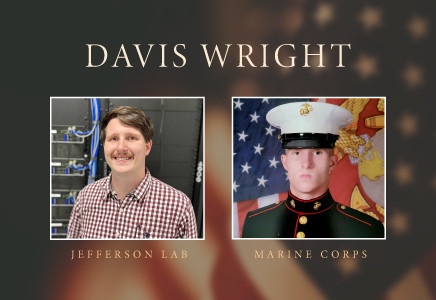One of the U.S. Marine Corps’ 11 leadership principles stands out the most to Davis Wright, a user-support technician II at the U.S. Department of Energy’s Thomas Jefferson National Accelerator Facility.
“Know yourself and seek self-improvement.”
As a high-school senior in 2011, he knew he wanted to find that wisdom.
“To be honest, I didn’t know what to do with my life,” Wright said. “I looked at colleges; I looked at universities, trades and other paths I could take, and none of them fit what I wanted to do. I said, ‘Hey, I’m not mature enough right now to plan the rest of my life. So, I could join the military, and make a contribution and an impact there, serve the country, and be set up to go to school when I get out.’”
He would go on to do just that.
Not only did Wright enlist in the military, but he also chose the branch that he felt would present the toughest test. He sought out the nearest Marine Corps recruiter, and two months after graduating high school, Wright found himself in Parris Island, South Carolina, for boot camp.
“I wanted the biggest challenge,” Wright said. “It looked like it would be the hardest one – and they look the best in uniform! I said, ‘This is it.’”
Though he was undecided about his future at 18 years old, he was undeniably drawn toward working on and with technology. After completing combat training at Camp Geiger, North Carolina, Wright was stationed at the Marine Corps Air Ground Combat Center in Twentynine Palms, California, where he attended military occupational specialty (MOS) school for the next 11 months. There, he earned MOSs as a ground radio and tactical remote sensor systems repairman.
While working with computers was Wright’s preference, the opportunity to work with ground radios, telephones, small computers and printers opened doors for the remainder of his five-year military career.
During Wright’s time at his next station at Camp Lejeune, North Carolina, he said that employing technology in the field helped him better understand his part of the Marines’ overall mission.
He also continued his work in ground radio maintenance before moving to tactical remote sensor system maintenance and becoming the floor chief of a maintenance shop. Wright moved up the ranks from private to sergeant. It was during this time that he tapped into his intrinsic aptitude for building relationships and teams.
“I was overseeing about 12 Marines and really helping them not only navigate their jobs but also their personal lives; it’s a very close family,” Wright said. “Being able to help people and mentor them, that was my favorite part, being able to touch peoples’ lives in a way.”
Through his experiences and service, Wright knew he found the direction and life lessons he had been looking for back in high school. Yet, in 2016, he faced a challenging decision: continue his Marine Corps career or reenter the civilian sector.
Wright chose the latter. He moved back home to Hampton, where he utilized the G.I. Bill and enrolled in the Information Technology program at Virginia Peninsula Community College, then known as Thomas Nelson Community College. After earning his associate’s degree, he began his pursuit of a bachelor’s degree from Old Dominion University. Soon after his return, Wright reconnected with a friend from middle school, Aubrie Davie, and they began dating and eventually married. Today, Wright and Davie are raising their 3-year-old daughter, Ophelia.
Before joining Jefferson Lab, Wright found himself working in a position that left him feeling professionally unfulfilled. But when a user support technician II position became open in late 2022, Wright applied, interviewed and was hired for the job in November 2022.
Today, he’s putting his skills and experience learned in the Marine Corps to work every day.
“We have leadership traits and principles, and the one principle that still sticks with me today is, ‘Know yourself and seek self-improvement,’” Wright said. “That translates so well in both the civilian and military worlds. That’s something that I’ve really taken away. You have to look inside yourself and say, “I can do this better,’ then get better at it.”
Thank you for your service, Davis Wright!
By John Streit


